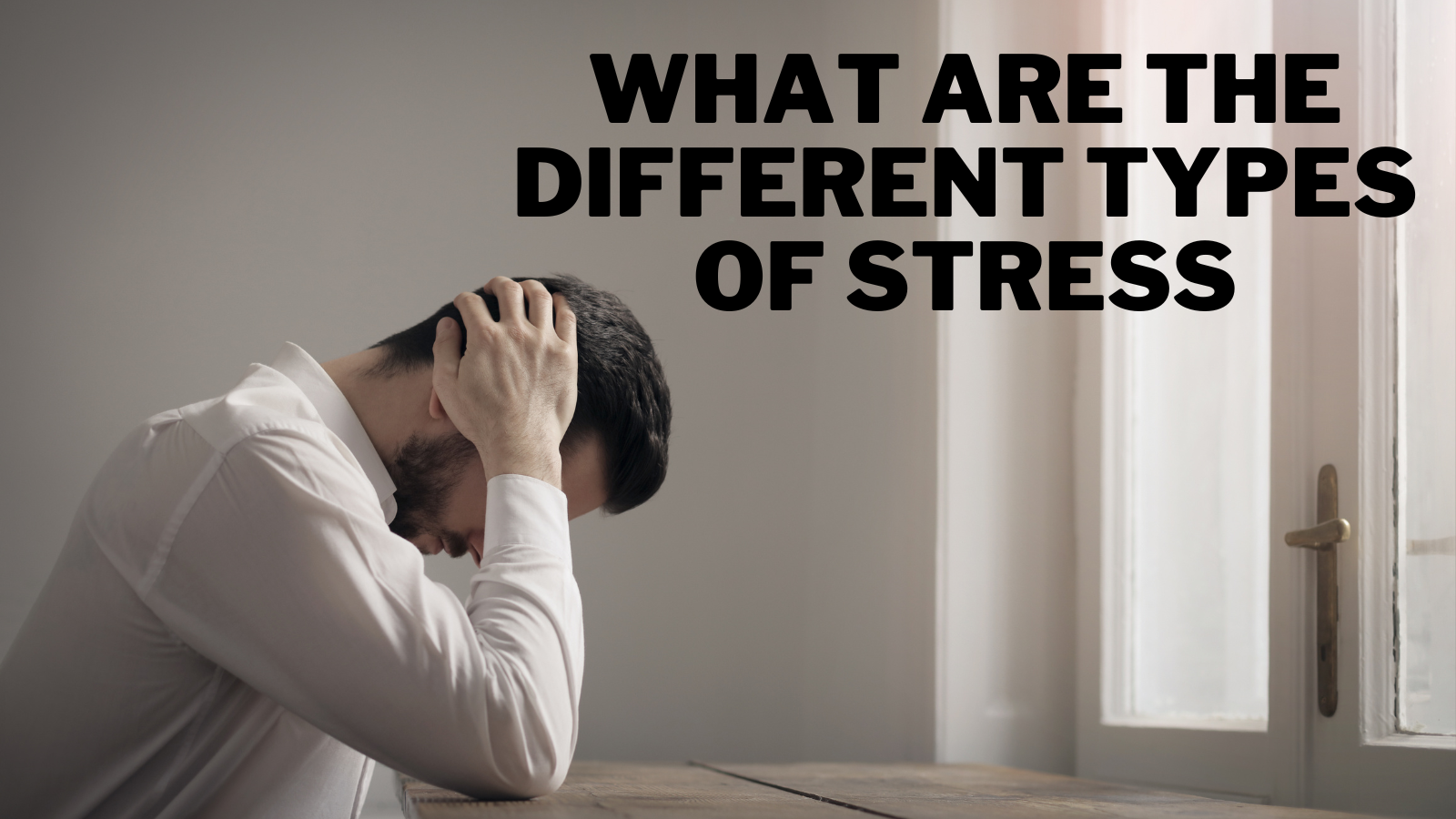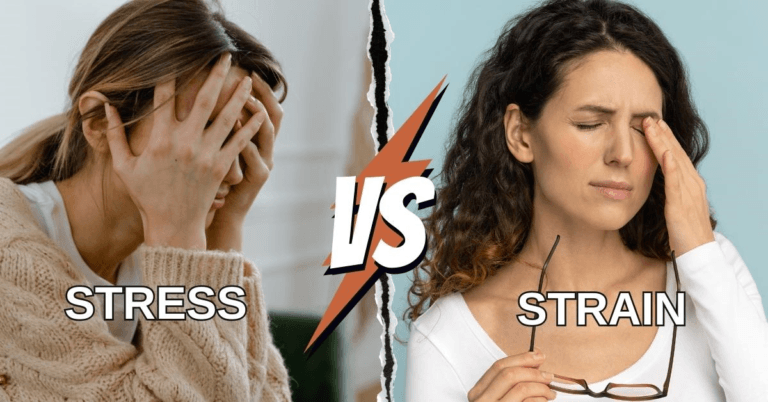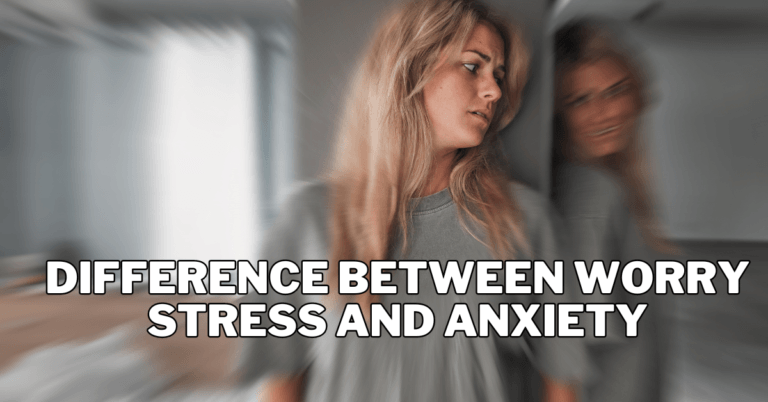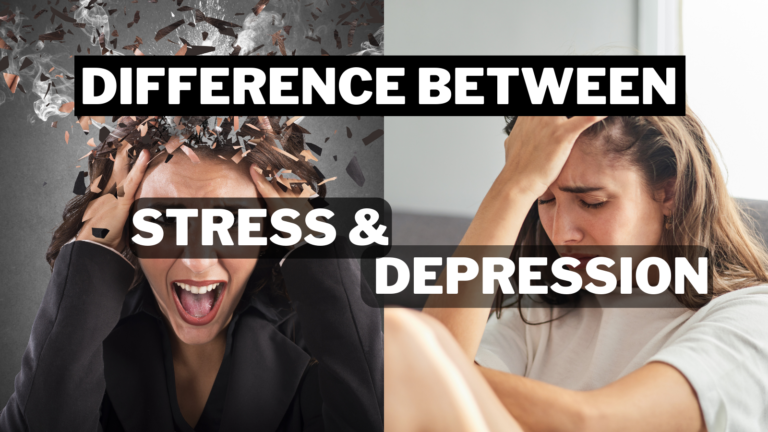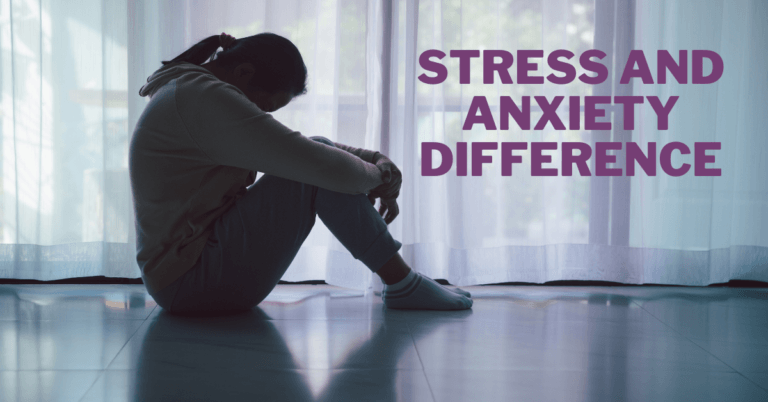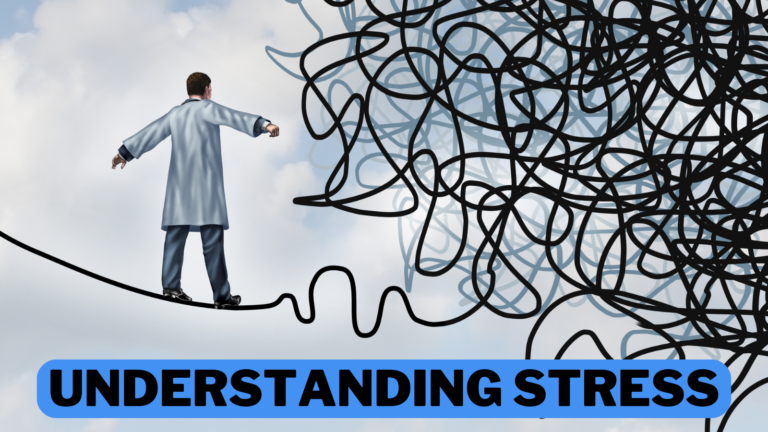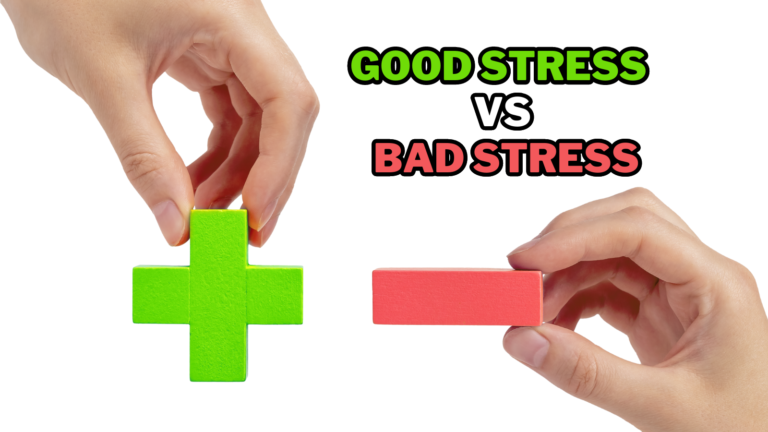What Are The Different Types Of Stress
What Are The Different Types Of Stress?
Stress is a common experience that everyone encounters at some point in life. The body's response to challenges or demands requires an individual to adapt or respond.
It can harm an individual's physical and mental health. Individuals can experience different types of stress.
This blog will explore the different types of stress and how they can affect our lives. From acute stress to chronic stress and from eustress to distress, we will examine the various categories of stress and how they can manifest in our daily lives.

What Is Stress?
Stress is a physiological and psychological response to a situation or event that is perceived as threatening or demanding.
The body's natural response to a perceived challenge or demand requires an individual to adapt or respond.
Various factors, such as work, relationships, financial difficulties, health issues, and major life changes, can cause stress.
When an individual experiences stress, their body releases a cascade of hormones, including adrenaline and cortisol, which trigger a series of physiological responses, including an increase in heart rate, blood pressure, and respiration.
These responses are designed to help the body react to a perceived threat, also known as the “fight or flight” response.
Stress can have both positive and negative effects on an individual's well-being. In small amounts, focus can be beneficial and motivate an individual to take action and solve problems.
This type of stress is known as eustress or “good stress.” However, chronic and prolonged stress can negatively affect an individual's physical and mental health. This type of stress is known as distress or “bad stress.”
Chronic stress can affect an individual's immune system, making them more susceptible to illness and disease.
It can also lead to mental health problems such as anxiety, depression, and burnout. Additionally, stress can harm an individual's relationships, work performance, and overall quality of life.

Different Types Of Stress
Individuals can experience different types of stress.
1. Acute Stress
Acute stress is a type of stress that is short-term and occurs in response to a specific event or situation.
It can be caused by various experiences, such as taking an exam, giving a presentation, or being involved in a car accident.
Acute stress triggers the body's “fight or flight” response, a physiological reaction that prepares the body to respond to a perceived threat.
This response causes an increase in heart rate, blood pressure, and respiration and can lead to anxiety and tension.
However, the stress typically subsides once the situation has passed and the body returns to normal.
While acute stress is normal, experiencing it frequently or for prolonged periods can negatively affect physical and mental health.
Chronic exposure to acute stress can increase the risk of developing health problems like heart disease, high blood pressure, and depression.
Therefore, it is essential to learn effective coping strategies to manage acute stress, such as deep breathing, exercise, and mindfulness techniques.
Seeking support from loved ones or a mental health professional can also help manage acute stress.

2. Chronic Stress
Chronic stress is a type of stress that is ongoing and can be caused by a variety of factors, such as work, relationships, financial difficulties, or health problems.
Unlike acute stress, chronic stress does not subside quickly and can persist for months or years.
Chronic stress can hurt an individual's physical and mental health and lead to health problems, such as high blood pressure, heart disease, depression, and anxiety.
Chronic stress can also lead to other negative effects on an individual's daily life. It can cause fatigue, irritability, and difficulty concentrating, making it harder to perform everyday tasks.
Chronic stress can also lead to sleep problems, such as insomnia, exacerbating other health problems.
3. Eustress
Eustress is a type of stress that is positive and motivating. It is caused by exciting events or challenges, such as getting married, starting a new job, or participating in a sport.
Unlike distress, which is negative and overwhelming, eustress can enhance an individual's performance and motivation, leading to feelings of excitement and fulfillment.
Eustress can positively affect an individual's physical and mental health. It can improve cognitive function, enhance immune function, and increase feelings of well-being.
Eustress can also improve an individual's self-esteem and confidence, leading to better performance in various aspects of life.

4. Distress
Distress is negative stress caused by various factors such as work overload, financial difficulties, or relationship problems.
Unlike eustress, which is positive and motivating, distress can harm an individual's physical and mental health. It can lead to conditions such as anxiety, depression, and burnout.
Distress can cause an individual to feel overwhelmed, anxious, and tense. It can also cause physical symptoms such as headaches, stomachaches, and muscle tension.
Long-term exposure to distress can negatively affect an individual's physical health, including an increased risk of heart disease, high blood pressure, and stroke.
It can also lead to mental health issues such as depression, anxiety, and post-traumatic stress disorder (PTSD).
5. Traumatic Stress
Traumatic stress is a type of stress that is caused by a traumatic event, such as physical or sexual assault, natural disasters, or war. Traumatic stress can profoundly impact an individual's mental and physical health.
It can lead to conditions such as post-traumatic stress disorder (PTSD), which can cause symptoms such as nightmares, flashbacks, and intrusive thoughts.
Individuals who experience traumatic stress may also develop symptoms such as anxiety, depression, and difficulty sleeping.
They may have trouble functioning daily and experience changes in their behaviour and emotions.
Traumatic stress can also cause physical symptoms such as headaches, gastrointestinal problems, and chronic pain.
It is important to seek help if you are experiencing traumatic stress. Treatment for traumatic stress may include psychotherapy, medication, or a combination.
Therapies such as cognitive-behavioural therapy (CBT) and eye movement desensitization and reprocessing (EMDR) can be effective in treating traumatic stress and helping individuals to manage their symptoms.

6. Hypostress
Hypostress is stress caused by boredom and a lack of stimulation. It can occur when an individual needs to be challenged or engaged in their work or activities, leading to disinterest, apathy, and dissatisfaction.
Unlike acute or chronic stress, hypostasis does not necessarily cause physical symptoms but can hurt an individual's mental health and well-being.
Individuals who experience hypo-stress may feel unchallenged, uninterested, and unmotivated. They may feel like their work or activities lack meaning and purpose, leading to dissatisfaction and disengagement.
Over time, hypostasis can lead to burnout and contribute to mental health issues such as depression and anxiety.
7. Anticipatory Stress
Anticipatory stress is a type of stress that is caused by the anticipation of a future event or situation.
It is a common experience and can affect people in different ways. Some people may feel excited or motivated by the prospect of a challenging situation, while others may experience intense anxiety and worry.
Anticipatory stress can cause physical symptoms such as sweating, shaking, and increased heart rate.
It can also lead to negative thoughts and emotions, such as self-doubt, fear, and anxiety. In some cases, anticipatory stress can be so severe that it affects an individual's ability to function and perform daily activities.
8. Episodic Acute Stress
Episodic acute stress is a type of stress that is characterized by a pattern of repeated episodes of acute stress.
This stress is often caused by a hectic and chaotic lifestyle or a tendency to take on too many responsibilities.
Individuals who experience episodic acute stress may tend to be irritable, anxious, and overreact to situations.
Episodic acute stress can lead to various physical and mental health problems, including heart disease, high blood pressure, and anxiety disorders.
Individuals with this type of stress may experience chronic tension headaches, migraines, or other physical symptoms related to stress.
9. Role Stress
Role stress arises from conflicting demands and expectations from an individual's roles, such as work, family, and community roles.
For example, an individual may experience role stress when they feel they cannot meet the expectations of their employer while also fulfilling their responsibilities as a parent or spouse.
Role stress can lead to feelings of being overwhelmed, exhausted, and burned out. It can also cause individuals to feel anxious and frustrated as they struggle to balance the competing demands of their various roles.

10. Environmental Stress
Environmental stress is a type of stress that arises from factors in an individual's environment, such as noise, pollution, and overcrowding.
For example, city dwellers may experience environmental stress due to high noise and air pollution. In contrast, individuals living in crowded conditions may experience stress due to a lack of personal space and privacy.
Environmental stress can lead to physical and mental health problems, including respiratory issues, headaches, and anxiety.
Exposure to environmental stressors can also exacerbate existing health conditions, such as asthma and allergies.
11. Social Stress
Social stress can be caused by various factors related to one's social environment. This can include feeling like an outsider or experiencing discrimination and prejudice based on race, ethnicity, gender, sexual orientation, religion, or other personal characteristics.
Social stress can be especially harmful to an individual's mental health and well-being, leading to depression, anxiety, and other mental health disorders.
People who experience social stress may feel like they don't belong in a particular social group or community.
This can lead to feelings of isolation, loneliness, and low self-esteem. They may also experience social exclusion, harassment, or bullying, which can cause significant emotional distress.
The effects of social stress on mental health can be long-lasting and pervasive. People who experience chronic social stress may be at a higher risk of developing mental health disorders, such as depression, anxiety disorders, and post-traumatic stress disorder (PTSD).
To manage social stress, seeking support from trusted friends, family, or mental health professionals is important.
Social support can help individuals cope with the negative effects of social stress and build resilience in challenging social situations.
Developing healthy coping mechanisms, such as practicing mindfulness, engaging in physical activity, and pursuing hobbies and interests, can also help reduce the impact of social stress on mental health.
12. Work-Related Stress
Work-related stress is a common stress that can significantly impact an individual's well-being and productivity.
Job demands, such as high workloads, long working hours, and tight deadlines, can cause stress and lead to physical symptoms such as headaches, fatigue, and sleep problems.
Interpersonal conflicts with colleagues, supervisors, or customers can also contribute to work-related stress and lead to frustration, anger, and resentment.
Job insecurity, such as the fear of losing one's job, can also cause stress and lead to anxiety and depression.

13. Financial Stress
Financial stress can significantly impact an individual's mental and physical well-being. The constant worry and anxiety about finances can lead to difficulty sleeping, irritability, and decreased productivity.
Long-term financial stress can also lead to chronic health conditions like heart disease, diabetes, and depression.
Additionally, financial stress can affect an individual's relationships and cause strain within their family or social circle.
Finding ways to manage and reduce financial stress, such as creating a budget, seeking financial assistance, or increasing income, can improve an individual's overall health and well-being.
14. Emotional Stress
Emotional stress is a type of stress that arises from internal emotional struggles or external situations that trigger intense emotional responses.
It can be caused by various factors, including losing a loved one, a difficult breakup, ongoing relationship problems, financial difficulties, work-related stress, and traumatic events.
Emotional stress can lead to various physical symptoms, such as headaches, muscle tension, fatigue, and digestive problems.
It can also increase the risk of developing mental health conditions like anxiety disorders and depression.
Coping with emotional stress can be challenging because it often requires addressing underlying emotional issues.
This can involve exploring difficult emotions, such as guilt, shame, or low self-esteem, and working to develop healthy coping mechanisms. It may also involve seeking support from friends, family, or mental health professionals.
15. Cognitive Stress
Cognitive stress can arise from tasks requiring significant mental efforts, such as complex problem-solving, decision-making, and memorization.
These tasks can cause stress and overwhelm when an individual feels they do not have the necessary skills, knowledge, or resources to complete them successfully.
Additionally, cognitive stress can be caused by having too many tasks to complete or being in a distracting or noisy environment.
Prolonged cognitive stress can lead to mental exhaustion, burnout, and physical symptoms such as headaches and muscle tension.
Effective stress management techniques, such as prioritizing tasks, taking breaks, and practicing relaxation techniques, can help individuals cope with cognitive stress better.
16. Psychosocial Stress
Social and psychological factors, including various experiences and circumstances, cause psychosocial stress.
For example, feeling lonely or socially isolated can be a significant source of psychosocial stress. Similarly, experiencing discrimination or bullying can lead to feelings of stress and anxiety.
Major life transitions, such as moving to a new city or starting a new job, can also be a source of psychosocial stress.
Changes can be disrupted and cause uncertainty and anxiety as individuals navigate new social and professional environments.
Psychosocial stress can have a range of physical and psychological effects on individuals. It can lead to headaches, muscle tension, fatigue, irritability, and difficulty sleeping.
Over time, prolonged exposure to psychosocial stress can also increase the risk of developing mental health issues such as anxiety and depression.

17. Medical Stress
Medical stress is a type of stress that is caused by health-related issues, such as chronic illnesses, surgeries, and medical procedures.
Medical stress can affect individuals of all ages and can be particularly challenging for those already dealing with health problems.
Chronic illnesses, such as diabetes or heart disease, can cause ongoing physical and emotional stress as individuals navigate the challenges of managing their condition.
The fear of complications or the need for frequent medical appointments can also contribute to feelings of stress and anxiety.
Surgeries and medical procedures can also be a significant source of medical stress. The fear of the unknown, concerns about pain or discomfort, and worries about the procedure's outcome can all contribute to anxiety and stress.
Medical stress can have physical and emotional effects on individuals. Physical symptoms include headaches, muscle tension, fatigue, and difficulty sleeping. Emotional symptoms include fear, anxiety, depression, and irritability.

Conclusion
Stress is a natural response to challenging situations and can be positive or negative.
- Acute, chronic
- Eustress
- Distress
- Traumatic stress
- Hypostasis
- Anticipatory stress
- Episodic acute stress
- Role stress
- Environmental stress
- Social stress
- Work-related stress
- Financial stress
- Emotional stress
- Cognitive stress
are just a few of the different kinds of stress that can exist. Each type of stress has unique characteristics and can impact an individual's physical and mental health differently.
It is important to understand the different types of stress and their causes to identify the sources of stress in our lives and develop effective coping mechanisms to manage them.
By managing stress effectively, we can improve our overall well-being, reduce the risk of developing physical and mental health problems, and lead healthier, more fulfilling lives.
With proper support and effective coping strategies, managing stress and living a balanced and healthy life is possible.
I trust you enjoyed this article about What Are the Different Types Of Stress? Please stay tuned for more blog posts to come shortly.
JeannetteZ
>>>Please click here to read my all-inclusive article about Lessons That Will Teach You All About Stress<<<
>>>Are you interested in Natural Healing And Stress Relief through Herbs? Please click here for my #1 Recommendation<<<
Your Opinion Is Important To Me
Thoughts? Ideas? Questions? I would love to hear from you. Please leave me your questions, experience, and remarks about this article, What Are the Different Types Of Stress, in the comments section below. You can also reach me by email at Jeannette@Close-To-Nature.org.
Disclosure
This post may contain affiliate links. I earn from qualifying purchases as an Amazon Associate and other affiliate programs. Please read my full affiliate disclosure.
You might also enjoy these blog posts:
Does Drinking Tea Reduce Stress?
All You Need To Know About Stress And Alcohol

